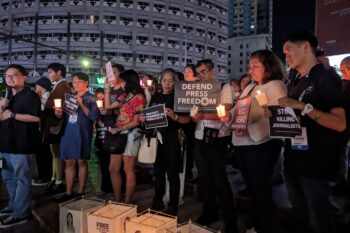GENERAL SANTOS CITY (MindaNews / 8 June) – The local government unit (LGU) of Tupi, South Cotabato stopped the implementation of its speed limit ordinance along its “killer highway” after a local court thrashed its motion for reconsideration, an official said Thursday.
But Mayor Reynaldo Tamayo Jr. said the LGU will appeal the local court’s decision to the Supreme Court for the safety of commuters, noting that the number of fatalities killed in road accidents along its highways is significantly higher “than the combined death toll in the Ampatuan Massacre and the Mamasapano tragedy.”
“The number of fatalities due to road accidents in our highway has reached 230,” Tamayo said.
Fifty-eight persons, including 32 media workers, were killed in the Ampatuan massacre, which was allegedly masterminded by members of the influential Ampatuan family on November 23, 2009 in the town of Ampatuan, Maguindanao.
In the Mamasapano tragedy, 44 members of the elite Special Action Force of the Philippine National Police were killed after a “misencounter” between the government forces and the Moro Islamic Liberation Front apparently due to lack of coordination. Twenty-two other MILF fighters and civilians were killed during the skirmishes on January 25, 2015.
Altogether, the death toll in the Ampatuan Massacre and the Mamasapano tragedy is 124.
“I am saddened by the thrashing of our motion for reconsideration. Our purpose in strictly implementing the speed limit is to ensure that drivers or commuters passing our highways can safely return to their homes,” Tamayo said.
The mayor said the LGU’s legal team is currently drafting the appeal, which they hope to submit to the Supreme Court next week.
But another option the LGU is mulling is to pass a road safety ordinance, where they will still incorporate a speed limit to protect lives on the roads.
The Regional Trial Court Branch 39 in Polomolok, South Cotabato declared last February 2 that Tupi’s Ordinance No. 688 is invalid. The Tupi LGU sought a motion for reconsideration for the speed limit ordinance but it was eventually rejected.
Tamayo said they started to stop the implementation of the speed limit ordinance Wednesday morning, in deference to the decision of the local court.
Hours later, there was an accident in the highway involving a vehicle and a motorcycle due to overspeeding, said the mayor, noting the motorcycle driver suffered serious head injuries.
“We will fight to restore the imposition of speed limit in our roads at the Supreme Court for the safety also of our pedestrians, who are now afraid to cross the highway because of fast moving vehicles,” he said.
Among those who questioned the town’s speed limit ordinance was the Regional Development Council, a policy-making body in Region 12 composed of public and private sector representatives.
The ordinance, which seeks to reduce road accidents, limits the speed to 40 kilometers per hour (kph) in the town center and 80 kph thereafter. Tupi is along the General Santos City-Koronadal City highway.
Based on Republic Act (RA) 4136 or the Land Transportation and Traffic Code, particularly Chapter IV, Section 35, there are different speed limits for different vehicles.
The maximum allowable speed “on open country roads, with no ‘blind corners’ and not closely bordered by habitation” is 80 kph for passenger cars and motorcycles and 50 kph for trucks and buses, it said.
“On ‘through streets’ or boulevards, clear of traffic, with no ‘blind corners,’ when so designated,” the speed limit is 40 kph for passenger cars and motorcycles and 30 kph for trucks and buses, RA 4136 said.
“On city and municipal streets, with light traffic, when not designated ‘through streets’,” the law said the speed limit is 30 kph for all types of vehicles.
“Through crowded streets, approaching intersections at ‘blind corners,’ passing school zones, passing other vehicles which are stationery, or for similar dangerous circumstances,” the speed limit is 20 kph for all types of vehicles, it said. (Bong S. Sarmiento/MindaNews)
